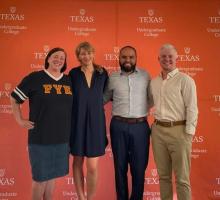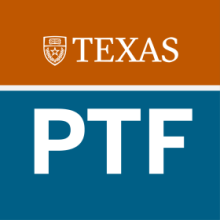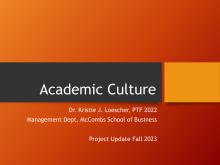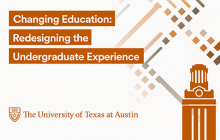PTF Impacts
Provost's Teaching Fellows have made lasting impacts in their departments, colleges and schools, all of the University of Texas, and even the broader scholarship of teaching and learning. Through both individual initiatives and university-wide programs, PTFs continue to serve as catalysts for positive change and further our campus culture of teaching and learning.
Displaying 1 - 19 of 19
Be Well to Do Well (Signature Course Resource)
This video project was designed to be shown in all Signature Courses at UT. Together with a discussion prompt, the video aims to acquaint students with mental and physical health resources on campus, and to teach them strategies for success.
Objective Structured Clinical Examination (OSCE) Performance Assessment of PharmD Student Pharmacists
Dr. Accosta, Dr. Castleberry, and colleagues presented a poster at a national pharmacy conference on the relationships between a student’s perceived preparedness before and after Objective Structured Clinical Examinations (OSCEs), OSCE grades, perception of their performance, pre-pharmacy and pharmacy GPAs, composite Pharmacy College Admission Test (PCAT) score, and admission Multiple Mini Interview (MMI) scores.

Teaching Tips 2023-2024
Each year, the PTF Chair-Elect has the opportunity to share recurring Teaching Tips with the all faculty at UT.
Effect on Students and Faculty of Implementation of a Comprehensive, Longitudinal Pharmacy Practice Laboratory Series into Doctor of Pharmacy Curriculum
Dr. Accosta, Dr. Castleberry, and Dr. Davis presented a poster at a national conference describing the Pharmacy Practice Lab (PPL) sequence spanning all six semesters of the UTCOP didactic program to consolidate lab components and increase skills development while aligning with and reinforcing curriculum balance.
Teaching Climate Change Canvas Module
A campus-wide faculty learning community constructed a canvas sandbox website where we could share materials related to climate change, with annotations, with the broader UT community. We collected our groups materials, and tried to organize them in a useful way. This includes lectures, activities, quizzes, projects, pre/post tests, etc. We organize both by learning objective, and by course. Our website is now live. A publication on pre/post survey results is being prepared.
Bringing Introductory Astronomy to a Broad Audience via Web-based Instruction
In 2024, I piloted a new web-based version of Astronomy 301 (Introductory to Astronomy), and taught it a second time in 2025. I attempted to include best practices for active learning, which was a challenge in this environment.

Teaching as Well Being (UT System)
3 different PTF projects presented:
Loescher project focuses on: Elevate excellence in the classroom through new strategies to understand, measure, and improve rigor in all courses
•each class is designed and delivered with the expectation of students learning at high levels •each student demonstrates learning at high levels
•each student is supported so they can learn at high levels
View the poster here
Pharmacy Practice Labs Promotional Video
Two promotional videos were created to highlight the impact of Pharmacy Practice Labs and collaboration with UT Athletic Training.
View the videos: Pharmacy Practice Labs and Partnership with UT Athletic Training

Teaching Tips 2022-2023
Each year, the PTF Chair-Elect has the opportunity to share recurring Teaching Tips with all faculty at UT. These messages cover a variety of topics, styles, and methodologies, from brief and practical classroom strategies to in-depth conversations with voices from across campus.
This year’s Teaching Tips were written by Chair-Elect Nina Telang, from the Chandra Department of Electrical and Computer Engineering.

The Evolution of Peer-Assisted Learning: From SI to PLUS (ASEE)
Former PTF chair Nina Telang co-presented this paper at the American Society of Engineering Education (ASEE) Annual Conference in August 2022.

Teaching Tips 2021-2022
Each year, the PTF Chair-Elect has the opportunity to share recurring Teaching Tips with all faculty at UT. These messages cover a variety of topics, styles, and methodologies, from brief and practical classroom strategies to in-depth conversations with voices from across campus.
This year’s Teaching Tips were written by Chair-Elect Jessica Toste, from the Department of Special Education.

Supplemental Instruction (SI) Program for Electrical and Computer Engineering
For her Provost's Teaching Fellows initiative, Nina Telang developed of a Supplemental Instruction (SI) program in a sophomore-level Electrical and Computer Engineering course, EE319K: Introduction to Embedded Systems.
Supplemental Instruction (SI) study sessions to help students succeed in introductory courses by employing a peer teaching model. SI Leaders – TAs or peers who have already successfully taken the course – plan and lead two identical, voluntary SI sessions each week, which students can join at any point in the semester.

Implementation of a new student initiative: Promoting Student Success and Well-Being (ASEE Gulf-Southwest)
Former PTF chair Nina Telang co-presented this paper at the American Society of Engineering Education (ASEE) Gulf-Southwest Annual Conference in March 2021. This paper shares a detailed look into the implementation of a new student initiative focused on promoting student success and well-being.
Read the complete paper <here,> or find the abstract below.

Qualitative and Quantitative Impact of Metacognitive Interventions in Supplemental Instruction Sessions (ASEE)
Former PTF chair Nina Telang co-presented this paper at the American Society of Engineering Education (ASEE) Virtual Annual Conference in June 2020.

Effectiveness of the Supplemental Instruction Program in First-Year Engineering Courses - A Longitudinal Report (ASEE)
Former PTF chair Nina Telang co-presented this paper at the American Society of Engineering Education (ASEE) Annual Conference in June 2019.

Drivers Exercise
Before deciding what your career goals are, it’s critical to know what you value most in a job. What gets you out of bed to go to start the day, go to work, and/or live your life? This exercise will help you define and prioritize what drives you. We provide definitions of 8 common "drivers". Once you understand these drivers, you can take the exercise and go through a ranking process to determine which are most important to you (i.e. you’re less likely to compromise on these) and which are less important (i.e. you’re more willing to compromise on these).

UT Provost's Teaching Fellows Initiative (Changing Education: Redesigning the Undergraduate Experience)
The 2017 Provost's Teaching Fellows Steering Committee prepared this poster as part of the Symposium Changing Education: Redesigning the Undergraduate Experience, hosted by Project 2021 and the Faculty Innovation Center at UT Austin on March 30, 2017. The format included keynote presentations punctuated by short talks and plenty of time for discussions in breakout sessions.

Health Communications Scholars Program
Launched in 2013, the Health Communication Scholars Program (HCSP) seeks to support graduate student research in health communication. HCSP was created by Dr. Mike Mackert within the Moody College of Communication and initially funded by the Provost’s Teaching Fellows program.

